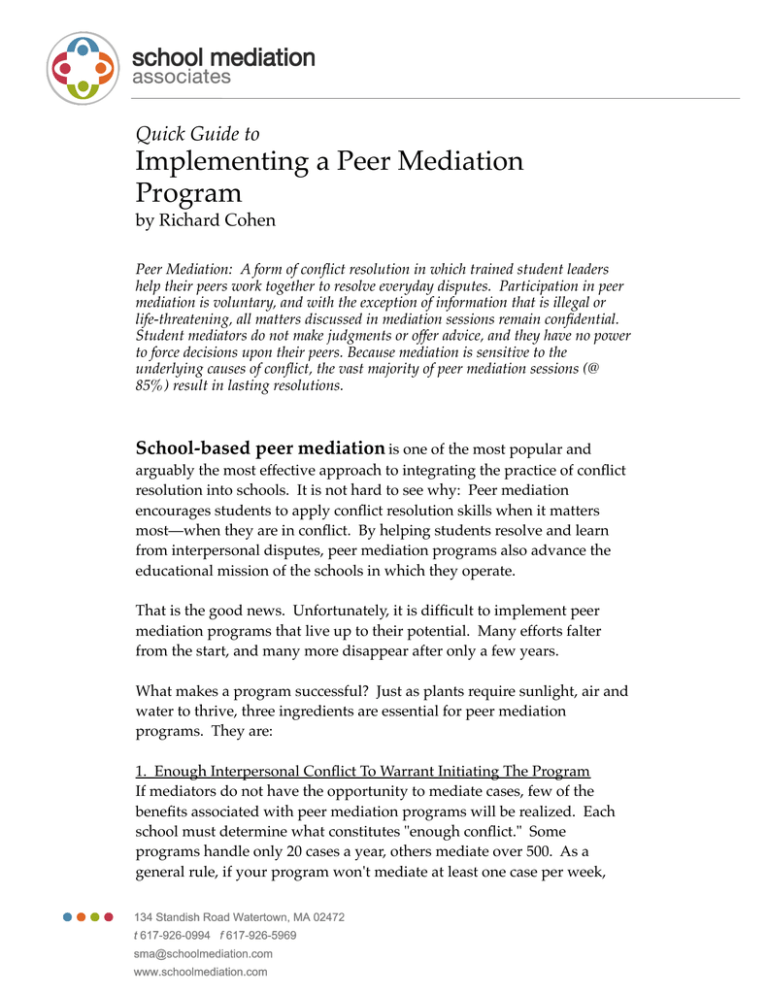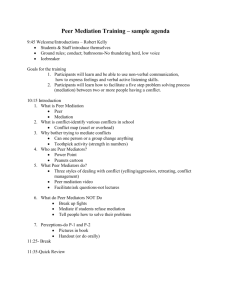Implementing a Peer Mediation Program Quick Guide to
advertisement

Quick Guide to Implementing a Peer Mediation Program by Richard Cohen Peer Mediation: A form of conflict resolution in which trained student leaders help their peers work together to resolve everyday disputes. Participation in peer mediation is voluntary, and with the exception of information that is illegal or life-threatening, all matters discussed in mediation sessions remain confidential. Student mediators do not make judgments or offer advice, and they have no power to force decisions upon their peers. Because mediation is sensitive to the underlying causes of conflict, the vast majority of peer mediation sessions (@ 85%) result in lasting resolutions. School-based peer mediation is one of the most popular and arguably the most effective approach to integrating the practice of conflict resolution into schools. It is not hard to see why: Peer mediation encourages students to apply conflict resolution skills when it matters most—when they are in conflict. By helping students resolve and learn from interpersonal disputes, peer mediation programs also advance the educational mission of the schools in which they operate. That is the good news. Unfortunately, it is difficult to implement peer mediation programs that live up to their potential. Many efforts falter from the start, and many more disappear after only a few years. What makes a program successful? Just as plants require sunlight, air and water to thrive, three ingredients are essential for peer mediation programs. They are: 1. Enough Interpersonal Conflict To Warrant Initiating The Program If mediators do not have the opportunity to mediate cases, few of the benefits associated with peer mediation programs will be realized. Each school must determine what constitutes "enough conflict." Some programs handle only 20 cases a year, others mediate over 500. As a general rule, if your program won't mediate at least one case per week, then peer mediation might not be the best fit for your school. 2. Administrative Support For peer mediation to succeed, administrators must work proactively to overcome attitudinal and structural resistance within their schools. In particular, administrators in charge of discipline must be willing to make referrals and support student mediators' efforts. 3. A Peer Mediation Coordinator Like the coach to the basketball team, the conductor to the orchestra, the peer mediation coordinator oversees all aspects of a peer mediation program. The more resources this school-based adult has in terms of skill, commitment, and time during the school day, the more successful the program is likely to be. When these three fundamentals are present in a school, chances are high that a strong mediation program will result. You can increase the likelihood of success still further by: a. helping to create a school philosophy and pedagogy which encourages students to take responsibility for their own education and work cooperatively with their peers. b. integrating conflict resolution into the school through other avenues, including teacher training and in the general curriculum. IMPLEMENTING THE PROGRAM The process of implementing a school-based mediation program can be divided into four stages. They are: 1. Generating Initial Support During this first stage program initiators hold meetings, conduct inservice workshops, deliver presentations (bringing experienced students and teachers from another school is especially effective), and distribute information packets/surveys in order to gain the support of key administrators and faculty. Once your school has decided to implement a peer mediation program, the most important task is to identify a coordinator. Coordinators can be vice-principals (but not disciplinarians), guidance counselors, teachers, special staff, and even community volunteers. Depending on the needs of the school and your program's resources, coordinators can work anywhere from full-time (the exception) to just one class period each day. It is also possible to have more than one individual "co-coordinate" a program. Responsibilities of the coordinator include: -handling in-school publicity and education of staff and students -overseeing the training of peer mediators -explaining mediation to students in conflict and encouraging them to try it -scheduling mediation sessions -supervising mediation sessions -following up on all cases and maintaining records -keeping the school community informed about the program's progress 2. Planning and Outreach The work of the second stage is usually the responsibility of the peer mediation coordinator. Some coordinators form advisory committees (comprised of administrators, teachers, students and parents) to help formulate program policies and develop outreach strategies. Below are ten important questions that must be answered during this stage: 1. How Will The Mediation Program Be Funded? • Consider long term as well as short term financial needs, and try to arrange for funding for the first three years. Initial and on-going costs include coordinator's salary, training, substitutes for teachers participating in training, and miscellaneous expenses (books, paper, Xeroxing, t-shirts, etc.). • Sources of funding include school system budgets, private foundations and corporations, and federal, state and municipal grants dedicated to such things as school safety, prevention of drug and alcohol abuse, school improvement, drop-out prevention, desegregation, violence prevention, and teacher development. 2. Which Students and Staff Will Be Trained To Mediate? • The trainees should be a diverse group that represents a cross section of the school community. Consider ethnicity, race, religion, socio-economics, academics, clique, age, sexual orientation, etc. • Include some "at-risk" students in the training. • Include key faculty who can help build support among their peers. • Advertise using school newspapers, assemblies, public address announcements. • Solicit recommendations from students, teachers and administrators. • Interview trainees and look for commitment, personal ability, and availability to mediate. 3. Who Will Conduct The Peer Mediation Training? • Only use trainers who have experience both as mediators and as trainers/teachers with the targeted age group. • Look for trainers within your school system (school-based staff, health coordinators) or outside of your system (school mediation training organizations, community mediation programs, university programs, educators from neighboring schools). 4. When Will The Training Be Scheduled? • Resistance to pulling students from class is likely and understandable. Stress that as a result of the training, students improve their self-esteem and learn essential skills (communication, problem solving, critical thinking) that can be invaluable to their academic and personal success. (Research has clearly demonstrated that students perform better academically after they have been trained to be mediators.) • Create a schedule that minimizes the time students miss any particular class. Training times include during school, after school, evenings, weekends, vacations, and any combination of the above. • Inform the faculty of the training schedule in advance so that they can plan accordingly. 5. Which Issues Will Be Mediated? • Remember that mediation is voluntary. • Keep in mind that the majority of school disputes result from relatively "minor" actions (e.g., gossiping, name-calling, poor sportsmanship, not returning borrowed items, boyfriend/girlfriend difficulties, etc.). • Most peer mediation programs will not mediate issues involving weapons, drugs, bullying, or serious physical violence. • Often, disputing students who receive disciplinary consequences can in addition benefit from participating in a mediation session if they so chose. 6. Where Will Mediation Sessions Be Held? • Mediation sessions should be held in space that affords auditory and visual privacy. • Peer mediation programs ideally have a room of their own. • Select a room that is separate from the disciplinary office and close to the coordinator's office/classroom. • The mediation room should either have an anteroom or be near another supervised area where disputants can wait during private sessions. 7. When Will Mediation Sessions Be Held? Possibilities include: • Whenever a dispute is referred (the best option). • Only during predetermined periods of the day (e.g. lunch periods). • According to the availability of the coordinator. • After school (programs that only mediate after school have not been very effective). 8. What Is the Program's Confidentiality Policy? • Preserving the confidentiality of what transpires during mediation is essential to the success of your program. • Student mediators must always be able to discuss cases with an adult coordinator (coordinators are considered within a program's promise of confidentiality). • Determine in advance which issues—suicide, drug addiction, weapons possession—coordinators will be required to report to administrators. Insure that mediators make parties aware of these exceptions before sessions begin! • The more limits upon confidentiality, the less students will trust and take advantage of the mediation process. • Secure a locked file cabinet in which to store program records. • Most programs guarantee only that mediators and the coordinator will keep matters confidential. If parties are concerned that their rivals will reveal private information outside of the session, they are encouraged to address this issue during the mediation process. 9. How Will The School At Large Be Informed About Mediation? • The number of referrals received—and consequently the impact that the program will have upon the school—is directly related to the level of understanding the school community has about mediation. • Methods to get the word out are limited only by your creativity, and include demonstration role-plays at school assemblies, seminars on mediation presented during homerooms and classes, poster contests, guerrilla theater, mediation t-shirts, articles in school newspapers, in-service workshops for staff, and so on. 10. What Kind of Follow-Up Training and Support Will Be Provided For The Mediators? • Student mediators should meet on a regular basis in order to share experiences, improve their skills, coordinate outreach efforts, and address internal disciplinary issues. 3. Training This brief phase encompasses the actual training of mediators. Peer mediation trainings for high school students run approximately eighteen to twenty-five hours, for middle school students twelve to twenty, and for elementary-aged students eight to fifteen hours. 4. Case-Work At the conclusion of the training, qualified peer mediators begin mediating cases. Coordinators conduct intake interviews, schedule mediations, select mediators, follow-up with disputants, meet regularly with mediators for case analysis and advanced training, and continue to educate the school community about the uses and benefits of mediation. Once your program is operating, how can you determine whether it is reaching its potential? Although each school must arrive at its own definition of success, three indicators of a "mature" peer mediation program are: a. The program directly serves at least 10% of the school population each academic year. b. One third of the conflicts mediated are referred by students themselves. c. Administrators perceive the program to be an integral part of the school and would resist any effort to eliminate it. When peer mediation programs are implemented effectively, student mediators are excited to offer their services, student parties are grateful for the help, and educators wonder how they got along without the program. Peer mediation can become a vital and important part of school life. Richard Cohen is founding director of School Mediation Associates and the author of Students Resolving Conflict: Peer Mediation in Schools (from which the information in this quick guide is condensed), The School Mediator's Field Guide: Prejudice, Sexual Harassment, Large Groups and Other Daily Challenges, and the enewsletter, “The School Mediator.” All are available at www.schoolmediation.com. Richard can be contacted at 617-926-0994 or at rcohen@schoolmediation.com.



